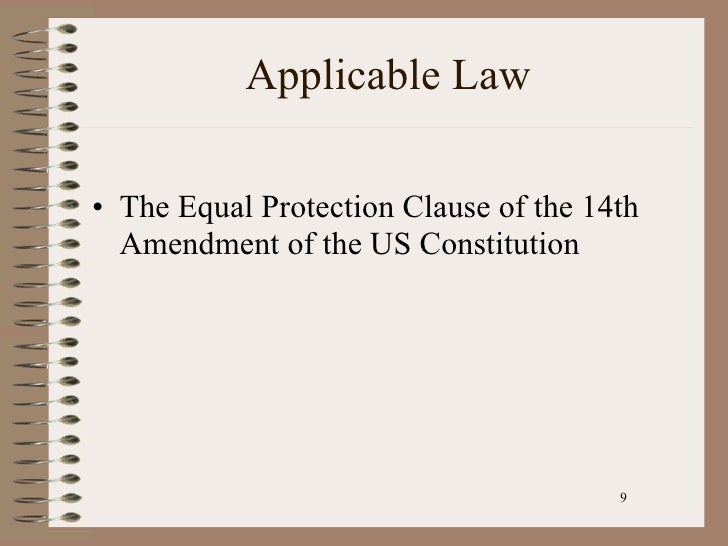

Conkling helped draft the 14th Amendment. Senator Roscoe Conkling to thank for the extension of Equal Protection to corporations.
#Equal protection clause of the 14th amendment full
The 14th Amendment, adopted after the Civil War in 1868 to grant emancipated slaves full citizenship, states, “No state shall … deprive any person of life, liberty, or property without due process of law, nor deny to any person … the equal protection of the laws.” The first big leap in corporate personhood from mere property rights to more expansive rights was a claim that the Equal Protection Clause applied to corporations. Constitution never mentions corporations, corporate personhood has been slithering around American law for a very long time. As lawyer David Gans has documented, despite the fact that the U.S.

Colbert’s verbal tick of saying that Citizens United granted corporate personhood is a tad misleading.Ĭitizens United did not grant corporations personhood. Stephen Colbert got a well deserved Peabody Award for his work educating the public about campaign finance laws with his lawyer Trevor Potter. If you’re a fan of the Colbert Report, “corporate personhood” might sound familiar. As Professor Elizabeth Pollman explains when it comes to Constitutional rights for corporations there is a hodgepodge: “corporations enjoy Fourth Amendment safeguards against unreasonable regulatory searches, but do not have a Fifth Amendment privilege against self-incrimination.” But of course some human rights make no sense for a corporation, like the right to marry, to parent a child, or to vote. Generally, corporate personhood allows companies to hold property, enter contracts, and to sue and be sued just like a human being. It all goes back to a legal fiction known as corporate personhood. How we got to the point where a for-profit corporation – not a church mind you – can lay claim to religious rights is a bit complicated. Hobby Lobby Stores, the Supreme Court has to choose whether to extend the logic of 2010’s Citizens United to allow a corporation to make a religious objection to a generally applicable law. But McCutcheon is not the only case that gives the Supreme Court chance to expand Citizens United’s reach this term. FEC, handed down last Wednesday, the Supreme Court built on the precedent of Citizens United by invalidating the federal aggregate contribution limit for individuals. Advance Constitutional Change Show / hide.National Task Force on Democracy Reform & the Rule of Law.Government Targeting of Minority Communities Show / hide.

Campaign Finance in the Courts Show / hide.Gerrymandering & Fair Representation Show / hide.Ensure Every American Can Vote Show / hide.


 0 kommentar(er)
0 kommentar(er)
